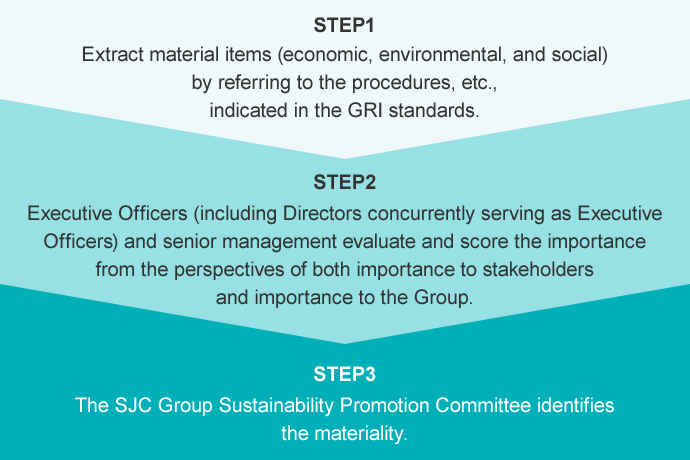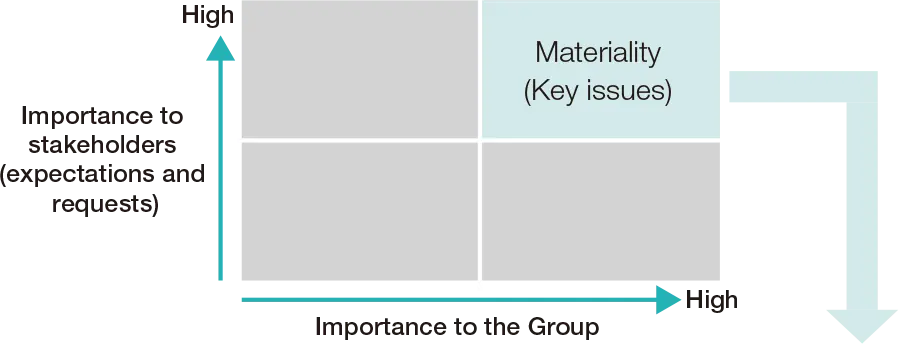SJC Group’s Materiality and Strategy
SJC Group has long been committed to business activities with the aim of creating a sustainable society by facing ever-changing social issues under our corporate philosophy: The aim of the Sekisui Jushi Group is to contribute to a safer, more secure and healthier environment for society by creating valued products and services, through the application of composite technology. As part of our efforts to continue and develop these initiatives, we have identified key issues (materialities) for the Group and will continue to promote business activities that provide safety and security for people’s lives and harmony with the environment.
In our Long-Term Vision 2030, we will set goals for each of the material issues below, and manage and report progress toward achieving those goals. We will also consider revising goals and adding action plans in response to changes in the internal and external environment.
Process for identifying materialities
The process for identifying materiality is as follows. We will continue to review the identified materiality as appropriate and promote effective initiatives.

Step1 : Extracting material items
Extract material items (economic, environmental, and social) by referring to the procedures, etc., indicated in the GRI standards.
Step2 : Evaluation
Executive officers (including directors concurrently serving as executive officers) and senior management evaluate and score the importance from the perspectives of both importance to stakeholders and importance to the Group.

Step3 : Identify
Identifying materiality at the SJC Group Sustainability Promotion Committee.
SJC Group’s Materiality
The identified material issues were categorized by business and environmental, social and governance (ESG) issues.
Business
- Contribution to disaster prevention/mitigation and national resilience
- Expansion of business domain
- Elimination of road traffic accidents and disasters
- Utilization of digital transformation (DX)
- Adaptation to and mitigation of climate change
- Enhancement of R&D capabilities
Environment (E)
- Decarbonization initiatives
- Contribution to building a sustainable society
- Promotion of deplasticization
Social (S)
- Promotion of diversity and inclusion
- Human resource development and expansion of educational opportunities
Governance (G)
- Enhancement of governance
Materiality KPIs and Action Plans
| Materiality | Action plan | Target (for FYE March 2030) |
|---|---|---|
| Sales expansion of products contributing to sustainability | Promote development of products contributing to sustainability and expand sales channels and opportunities | Consolidated net sales ratio of 70% or more |
| Promotion of diversity and inclusion | Promote diversity among core personnel | Diversity among core personnel beyond new male graduates (mid-career hires, females, non-Japanese, etc.) 30% or more |
| Support for employee work-life balance |
Provide childcare and nursing care support systems Practice health management |
Become certified as a White 500 company with excellent health management |
| Enhancement of organizational sustainability | Implement succession planning for each management level | 100% succession readiness rate for executive positions |
| Enhancement of decarbonization initiatives | Reduce CO2 emissions | Reduce by 46% (compared to FY 2013) |
| Expansion of 3R system deployment | Reduce single-use plastic in product packaging | Reduce by 25% (compared to FY 2021) |
